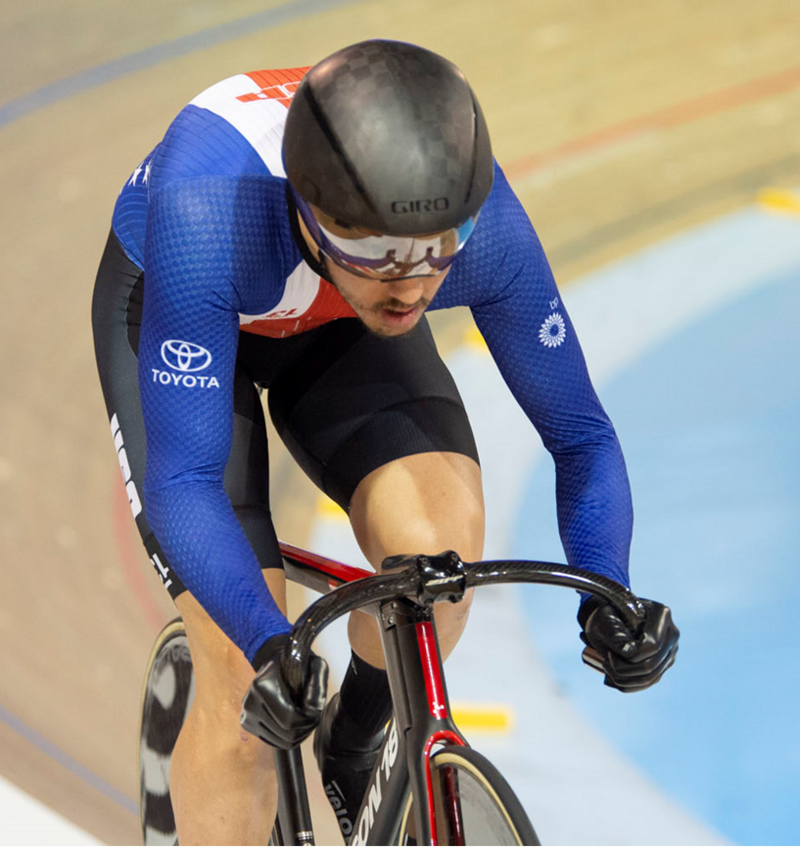
Breaking the World Record
Recently I was given the opportunity to Represent Team USA at the UCI Paracycling Track World Championships held in Milton, Canada. The second event of a 4-race omnium is the Flying 200, a 3.5 lap race where the only timed section is the final 200 meters, and I broke the world record in my disability category (MC5). Obviously, I was trying very hard during the race, but races are won or lost through preparation, which is what I’m alluding to with the title of this post. The omnium is not a qualifying event at the Paralympic Games in Tokyo for 2020, so this specific effort was not a priority for my preparations. I had not completely ignored the 200 in training, but my preparations for the entire competition were somewhat hampered by the unfortunate fact that I broke a rib three weeks before the start of the race.
It goes without saying breaking bones so close to competition is less than ideal, but it could have been worse. I missed a box jump attempt at a gym training session and landed on my back, which ended up cracking a rib. The practical result was that I was not able to do any efforts in the lead-up to world championships which involved standing on the pedals or pulling on the handlebars, which are integral components of sprinting and getting up to speed as fast as possible. So how did I manage to perform well despite breaking my rib? I applied the lessons learned from having a disability.
What My Disability Has Taught Me
Those that know me well understand how adamant I am about acting in accordance with one’s philosophies. I once read a quote that resounded in my soul that to consistently act in accordance with one’s philosophies is one of the hardest things to do in life. It’s easy to talk the talk, but much harder to walk the walk.
Being a person with a disability has taught me several lessons:
- Accept reality as it is and not what I’d wish it to be. My arm just does not work very well. The muscles in my back and shoulder that connect to that arm are atrophied. The reality is that there are certain things I just can’t do, certain things I can do with adaptation, and certain things that will injure me if I am too stubborn to admit I need assistance. After this recent injury to my rib, I did not waste any time or energy regretting the fact that the injury occurred. I accepted that the plan had to change to be my best. I’m a firm believer that it takes just as much energy to complain about as problem as it does to address it head-on.
- Focus on what you can do instead of what you can’t. My disability is from a birth injury, so it’s all I know. I was not raised believing I could not do things. I grew up figuring out how I can get things done, even if it was a different method than others. Post box jump, I couldn’t practice accelerating by standing and pulling, but I could do anything on the bike from a seated position without pain, so focusing on that became my new game plan.
- Be patient. The dexterity in my left hand is extremely poor. I once spent 45 minutes trying to button the right cuff on a dress shirt using my left hand. Was that a frustrating experience? Of course. Did that experience leave a lasting impression on me? Absolutely. I learned that you cannot rush progress or loathe how long it takes. I learned that if you begin, you will eventually find an end. During the final preparation phase of my training, I was surely tempted to grit through the pain to practice standing efforts, but I had to remind myself that patience was best. Gutting it out through pain would have changed the mechanics of what I was practicing, so why bother practicing a skill incorrectly? I just had to trust that pain was a signal from my body to not make it worse. I had to be patient and trust that things would heal up in time if I got out of the way. I was very happy that in the days leading up to the actual competition, the pain had subsided enough that I felt ready to perform.
I did not do any training leading up to the World Championships with the mindset that I was going to break a world record. I did pour my heart and soul into my training for the past 10 years with the mindset of trying to be the best version of myself possible. If you listen to any high performer in any field, it becomes clear how important mindset is when it comes to achieving lofty goals. My mindset has undeniably been shaped by the daily trials and tribulations that came with growing up with a physical impairment. I can’t say that I’m a better person or athlete than I would have been without my disability, but I can say that disability has helped me to learn life’s lessons and I value all the experiences, both good and bad, that I’ve had the opportunity to encounter.